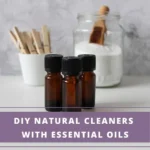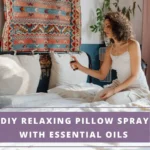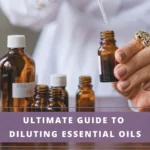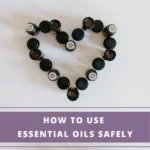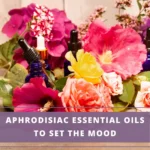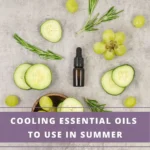As an Amazon Associate I earn from qualifying purchases. See Full Disclosure Here
In a world where persistent anxiety has become an all-too-familiar companion, the search for natural remedies that can bring relief is more important than ever. One such solution that has gained significant attention is the use of essential oils for anxiety.
Anxiety can cast a shadow on even the brightest of days, leaving us feeling unsettled and yearning for a sense of calm. While seeking professional help is essential for managing anxiety, incorporating natural remedies like essential oils into your self-care routine can provide additional support.
Enter essential oils, nature’s fragrant gift that holds the promise of calming our anxious minds and restoring balance to our spirits.
How Essential Oils Work To Calm Anxiety – What The Research Shows
Before I recommend the use of essential oils for anxiety or any other use, I always take time to delve into the research studies. A search for the benefits of aromatherapy for anxiety brought up several interesting clinical studies.
Studies conducted on various test groups, from nurses in palliative care to burn patients and others, all showed the same thing. Essential oils are effective in reducing anxiety levels.
According to these research studies, Essential oils contain a complex mixture of chemical components that contribute to their anxiety-calming effects. These components work synergistically to produce a range of therapeutic benefits.
While each oil has its unique composition, several common constituents are known for their anxiety-relieving properties:
– Linalool: A terpene alcohol found in essential oils such as lavender, bergamot, and ylang ylang, linalool is known for its calming and sedative effects on the nervous system.
– Limonene: Known for its uplifting and mood-enhancing properties, Limonene is a terpene commonly found in citrus essential oils like bergamot, lemon, and sweet orange. It helps alleviate anxiety by reducing stress and promoting a sense of well-being.
– Alpha-Pinene and Beta-Pinene: Found in various essential oils, including pine, rosemary, and juniper, alpha-pinene and beta-pinene are terpenes that possess anti-anxiety properties. These compounds have been found to reduce anxiety by interacting with neurotransmitter systems in the brain.
– Terpinene-4-ol: A terpene alcohol found in essential oils such as tea tree and marjoram, Terpinene-4-ol acts on GABA receptors, promoting relaxation and reducing anxiety symptoms.
– Esters: Esters are chemical compounds found in essential oils like lavender, Roman chamomile, and clary sage. In addition to contributing to the pleasant and soothing aroma of these oils, esters also possess sedative properties, promoting relaxation and reducing anxiety. They can help calm the nervous system and induce a sense of tranquility.
These are just a few examples of the many components found in essential oils that can help calm anxiety. The combination and concentrations of these components in each oil contribute to their unique therapeutic effects.
When using essential oils for anxiety, it’s advisable to choose high-quality, pure oils and follow proper dilution guidelines to ensure safety and efficacy.
10 Best Essential Oils for Anxiety
1. Lavender
 Widely recognized for its calming properties, Lavender is one of the best essential oils for treating anxiety, stress, and insomnia. Its gentle floral scent has a remarkable ability to reduce anxiety and stress and promote relaxation.
Widely recognized for its calming properties, Lavender is one of the best essential oils for treating anxiety, stress, and insomnia. Its gentle floral scent has a remarkable ability to reduce anxiety and stress and promote relaxation.
You will find lavender listed as one of the main ingredients in many products that promote sleep and relaxation, calm anxiety, and reduce stress.
The fresh, floral aroma of lavender essential oil is due to its high content of linalool and linalyl acetate. Several studies have shown that both of these ingredients are also effective in easing restlessness, improving sleep quality, and allaying anxious thoughts.
Its quick action is one of the reasons why lavender tops the list of essential oils for anxiety. Whether inhaled directly or diffused in your living space, lavender oil can create a tranquil atmosphere that promotes a sense of calm.
2. Bergamot
 Bergamot is known for its mood-lifting and anxiety-reducing properties. This essential oil is extracted from the skin of bergamot, a fruit that belongs to the citrus family.
Bergamot is known for its mood-lifting and anxiety-reducing properties. This essential oil is extracted from the skin of bergamot, a fruit that belongs to the citrus family.
Bergamot essential oil has a unique citrusy scent. Inhaling its aroma invigorates the senses, relaxes the nervous system, and lifts mood. All of these effects help to calm anxiety.
Inhalation through a diffuser or application to pulse points can help uplift your mood and ease anxious feelings.
3. Roman Chamomile
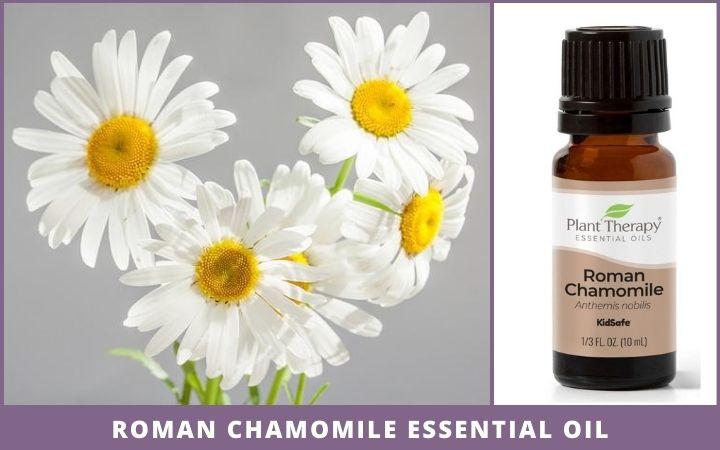 Well known for its calming, relaxing, and sedating properties, chamomile has been used as a natural remedy to soothe nervous tension, reduce irritability, and promote relaxation.
Well known for its calming, relaxing, and sedating properties, chamomile has been used as a natural remedy to soothe nervous tension, reduce irritability, and promote relaxation.
The sweet, apple-like aroma of chamomile essential oil has a comforting effect on the mind and body. It is often used to instill a sense of calm both in mind and body.
Chamomile also helps induce sleep and is a common ingredient in many herbal teas used to manage insomnia. Chamomile tea is also popularly used to help induce sleep.
A few drops of chamomile oil in a warm bath or blended with a carrier oil for massage can provide soothing relief.
4. Rose
 Extracted from fresh rose petals, rose essential oil is renowned for its proven calming and balancing properties.
Extracted from fresh rose petals, rose essential oil is renowned for its proven calming and balancing properties.
Rose essential oil has a luxurious uplifting fragrance that relaxes the senses. Inhaling its aroma promotes feelings of hope, joy, and self-esteem while suppressing stress and anxiety.
Rose oil is often used to alleviate anxiety, depression, and emotional stress. Its aroma can evoke feelings of comfort, love, and serenity.
Its distinctively feminine aroma makes rose essential oil a popular addition to women’s skin and wellness products.
Rose also tops the list of best aphrodisiac essential oils.
5. Neroli Oil
Neroli essential oil is derived from the blossoms of the bitter orange tree. It has a sweet, floral scent with citrus undertones
Known for its calming and soothing effects on the nervous system, neroli essential oil can help reduce anxiety, promote relaxation, and uplift the mood.
Neroli oil is often used in aromatherapy to instill a sense of peace and harmony.
6. Ylang Ylang
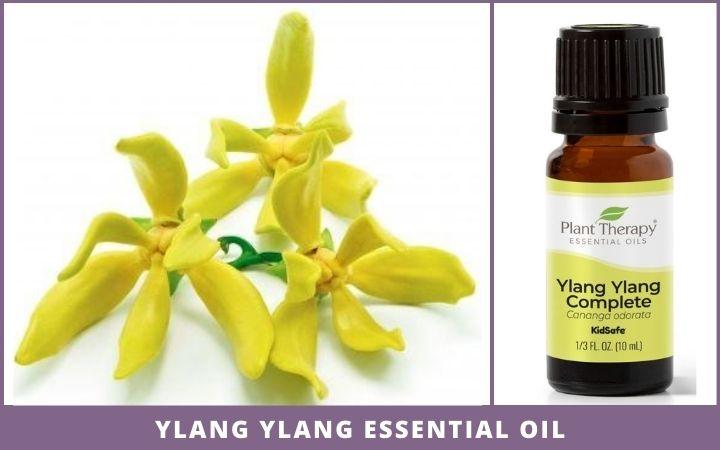 Ylang Ylang essential oil has a sweet, strongly floral aroma that has a harmonizing effect on emotions, making it a valuable essential oil for anxiety relief
Ylang Ylang essential oil has a sweet, strongly floral aroma that has a harmonizing effect on emotions, making it a valuable essential oil for anxiety relief
Inhaling the aroma of ylang-ylang helps reduce nervous tension, promote relaxation, and balance emotions. It is particularly helpful in providing immediate relief from stress and anxiety.
A few drops added to a carrier oil and used for a soothing massage or inhaled during a meditation session can provide a sense of calm and tranquility.
7. Frankincense
 Extracted from the Boswellia tree in Africa, Frankincense essential oil is a grounding oil that has been used in spiritual and religious ceremonies for centuries.
Extracted from the Boswellia tree in Africa, Frankincense essential oil is a grounding oil that has been used in spiritual and religious ceremonies for centuries.
Its woody and earthy aroma is deeply grounding and has a profound effect on the mind and body.
Inhaling the aroma of Frankincense essential oil helps calm the mind, reduce anxiety, and enhance spiritual connection.
Diffuse it, inhale directly, or dilute it in a carrier oil for massage to promote relaxation and a sense of peace.
8. Clary Sage
 Derived from the flowers and leaves of the Clary sage plant, this essential oil has a warm, herbal aroma that’s known for its ability to reduce stress, anxiety, and nervous tension.
Derived from the flowers and leaves of the Clary sage plant, this essential oil has a warm, herbal aroma that’s known for its ability to reduce stress, anxiety, and nervous tension.
Clary sage essential oil works to ease anxiety by uplifting mood, promoting a sense of tranquility, and improving self-confidence.
9. Patchouli
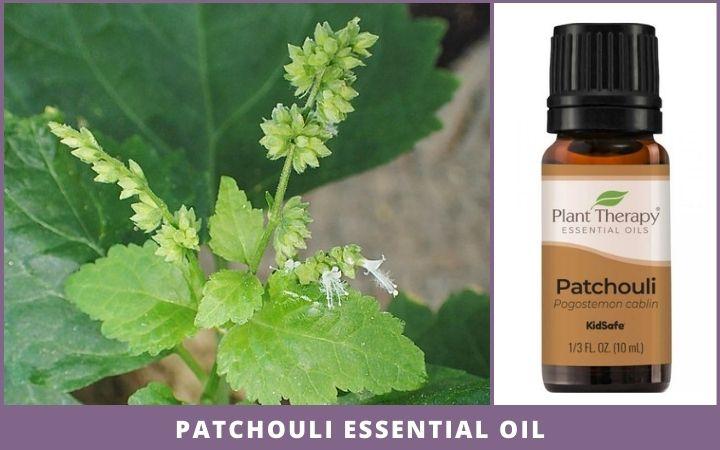 Patchouli oil, derived from the leaves of the Patchouli plant, has a deep, earthy aroma. It is often used in aromatherapy to alleviate anxiety and promote relaxation.
Patchouli oil, derived from the leaves of the Patchouli plant, has a deep, earthy aroma. It is often used in aromatherapy to alleviate anxiety and promote relaxation.
Patchouli essential oil is thought to have grounding and balancing effects, helping to calm the mind and uplift the mood.
10. Vetiver
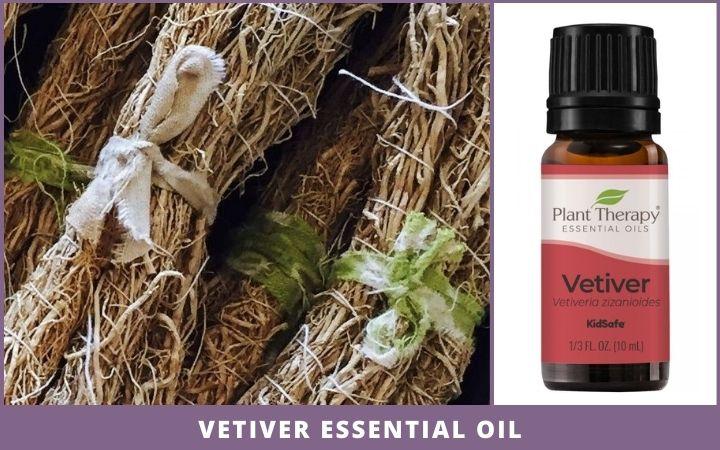 Extracted from the roots of Vetiver grass, this oil has a rich, woody scent and is often used in aromatherapy for its calming and comforting effects.
Extracted from the roots of Vetiver grass, this oil has a rich, woody scent and is often used in aromatherapy for its calming and comforting effects.
Vetiver essential oil has been found to help reduce anxiety and promote relaxation by soothing the nervous system and enhancing emotional stability.
These essential oils for anxiety can be used individually or blended together to create personalized anxiety-relieving aromatherapy blends.
It’s important to remember that individual responses to essential oils may vary, so it’s recommended to perform a patch test and start with low dilutions
How To Use Essential Oils for Anxiety
Listed below are some of the many ways to use essential oils for anxiety:
Inhalation
Inhalation is one of the most effective methods to experience the anxiety-relieving benefits of essential oils.
Here are a few inhalation techniques you can try:
– Direct Inhalation: Place a drop or two of the chosen essential oil on a tissue or cotton ball and hold it close to your nose. Inhale deeply, allowing the aroma to envelop your senses.
– Aromatherapy Diffuser: Add a few drops of essential oil to a diffuser filled with water. Let the diffuser disperse the aromatic mist throughout your space, creating a calming ambiance.
– Steam Inhalation: Add a few drops of essential oil to a bowl of hot water. Lean over the bowl, covering your head with a towel, and inhale the steam deeply. Be cautious of the hot water to avoid burns.
Topical Application
Topical application allows the essential oils to be absorbed through the skin, providing a localized and systemic effect. However, it’s crucial to dilute essential oils with a carrier oil before applying them to the skin to avoid skin irritation. Here’s how to use essential oils topically:
Massage
Dilute a few drops of essential oil in carrier oil, such as sweet almond oil or coconut oil. Gently massage the diluted oil onto your neck, shoulders, or other areas of tension. The combination of touch and aromatherapy can promote relaxation.
In The Bath
Add a few drops of essential oil and carrier oil to a warm bath and agitate the water to disperse the oil. Soak in the bath for 15-20 minutes, allowing the aroma and properties of the oil to envelop you.
Learning how to use essential oils in the bath the right way is key to getting the calming and rejuvenating benefits of aromatherapy.
In The Shower
Don’t have the luxury of time to soak in the bath? Using anxiety essential oils in the shower can help. Learn more about how to use essential oils in the shower for a calming aromatherapy experience.
Roll-Ons
Create your own essential oil roll-on blend by diluting the oil with a carrier oil and transferring it to a roller bottle. Apply the blend to pulse points, such as the wrists or temples, for quick and convenient use throughout the day.
25 more ways to use essential oils for anxiety without a diffuser
Inhalers and Personal Diffusers
Portable inhalers or personal diffusers are practical options for using essential oils on the go. These devices allow you to have your favorite anxiety-relieving oil blend readily available. Simply add a few drops of essential oil to the inhaler or diffuser pad, and inhale whenever you need a moment of calm.
Remember to start with a low concentration of essential oil and gradually increase as needed. Each person’s sensitivity to essential oils may vary, so it’s important to listen to your body and adjust the dosage accordingly.
Incorporating essential oils into your daily self-care routine can provide a soothing and natural approach to managing anxiety.
Experiment with different oils and techniques to discover what works best for you.
Massage Oil Recipe to Calm Anxiety
10-12 drops of your preferred essential oil to calm anxiety
2 ounces carrier oil – grapeseed, coconut, sweet almond, jojoba
This recipe is not just limited for use as a massage oil. If you are traveling, rub a little bit of the mix on your wrists, neck, or soles of the feet to calm anxiety.
You can also just rub a little of the mix into your palms, cup your palms near your face and breathe deeply for an instant feeling of relaxation.
Precautions When Using Essential Oils for Anxiety
Do not use essential oils for anxiety if you are pregnant or nursing.
Never apply essential oils directly to the skin without first diluting with a carrier oil.
Always speak to your doctor before you start using aromatherapy for anxiety.
If you experience any adverse reactions, discontinue use and consult a healthcare professional.
Essential oils should never be ingested without proper guidance from a qualified aromatherapist or healthcare provider.
If you have any underlying health conditions or are pregnant or nursing, consult with a qualified aromatherapist or healthcare professional before using essential oils.
Above all, it’s important to note that while essential oils can be beneficial for managing anxiety, they are not a substitute for professional treatment.
If you have severe or persistent anxiety symptoms, it’s essential to consult with a healthcare professional for a comprehensive approach to your well-being.
It’s advisable to use aromatherapy for anxiety only as a way to complement and support professional treatment.
Learn how to use essential oils safely.

Disclaimer: This information is not intended to serve as medical advice. Please consult your doctor before using any natural medication or if you experience any unusual symptoms. See Full Disclaimer here.




